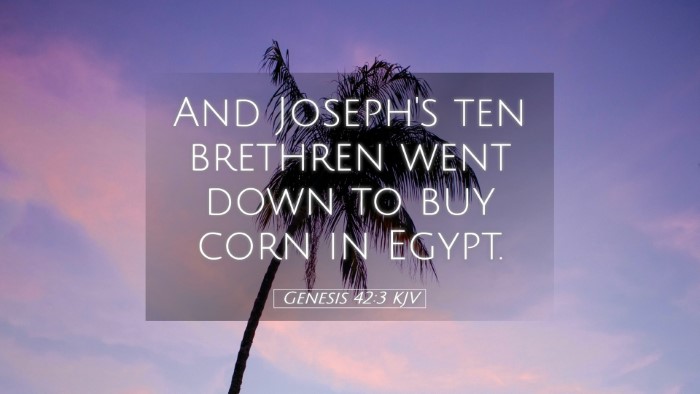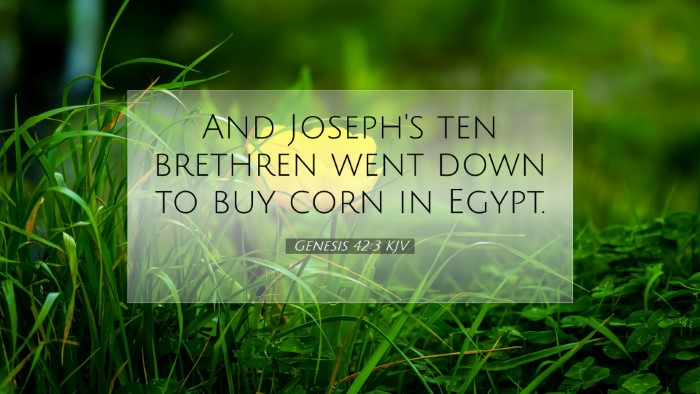Commentary on Genesis 42:3
Bible Verse: Genesis 42:3 - "So ten of Joseph's brothers went down to buy grain in Egypt."
Introduction
This pivotal moment in Genesis marks a significant transition for Joseph’s family and the unfolding of God's greater plan. The act of the ten brothers traveling to Egypt for grain is not simply a logistical necessity in a time of famine; it is laden with deeper theological and personal implications. The commentaries of Matthew Henry, Albert Barnes, and Adam Clarke provide rich insights into this verse, emphasizing themes of providence, reconciliation, and humanity’s struggles.
Contextual Analysis
The events leading up to Genesis 42 reveal a family fractured by jealousy and betrayal. Joseph, favored by his father and the target of his brothers’ envy, was sold into slavery. While Joseph's journey in Egypt is a story of adversity and divine providence, the brothers' decision to travel reflects their desperation and awareness of their past wrongdoing.
Matthew Henry's Perspective
Matthew Henry highlights the divine orchestration at play in the journey of these brothers. He suggests that their travel to Egypt symbolizes not only their physical needs but also their moral and spiritual searching. Henry asserts, “When we are in distress, we often remember our brothers’ offenses against us.” The brothers' journey is implicitly intertwined with feelings of guilt; their famine is not just one of crops but also of familial unity and repentance.
Albert Barnes' Commentary
Albert Barnes notes the urgency of the brothers' actions, pointing out that their choice represented a desperate effort to save their families amid the famine ravaging the land. He interprets their descent into Egypt as a literal and metaphorical journey into the unknown, emphasizing that Egypt, often viewed as a place of bondage, also functions as a setting for God’s redemptive work. Barnes proclaims, “Their journey to purchase grain was a step toward the restoration of Joseph and a prelude to the fulfillment of God’s promises.”
Adam Clarke's Insights
Adam Clarke elaborates on the geographical and historical context of this passage, noting that the famine was not only widespread but also dire enough to compel Joseph’s brothers to seek help outside of Canaan. He comments on the necessity of humility in seeking assistance, as these men who once humiliated their brother are now driven by need to confront the consequences of their actions. Clarke expresses the notion that, “Every step taken for relief was underlined by their guilt, revealing the nature of true repentance.”
Theological Implications
The journey to Egypt serves multiple theological implications worth considering for pastors, theologians, and scholars. Each commentary offers a different perspective, but collectively they invite a deeper reflection on the nature of redemption and forgiveness.
Providence and Sovereignty
All three commentators converge on the idea of God’s providential hand at work. The brothers’ decision, though stemming from desperation, cannot be separated from God’s overarching plan. Their very actions lead them toward a confrontation with Joseph, setting the stage for reconciliation that God had already orchestrated. As Henry remarks, “Events often lead us toward the fuller truth of God’s plans.”
Restoration and Forgiveness
Clarke emphasizes the opportunity for restoration inherent in this event. The brothers are unwittingly moving toward a path that will lead them to confront their guilt and seek forgiveness, not only from Joseph but also from God. This highlights a crucial point in Christian theology about the importance of seeking reconciliation and the transformative power of grace. Barnes urges, “The act of purchasing grain becomes an act of purchasing hope.”
Humanity’s Quest for Survival
Moreover, this narrative shows the universal human experience of struggle and survival. It reflects the lengths to which individuals and families will go during times of crisis. The brothers’ action can resonate with individuals in modern times who find themselves in dire straits, showing that the narrative of Genesis speaks to human existence across generations.
Conclusion
Genesis 42:3 is not merely a geographical marker indicating the brothers’ descent into Egypt, but rather a profound statement about humanity’s condition—facing famine, fear, and the consequences of past actions. As derived from the insights of Henry, Barnes, and Clarke, this verse sets in motion themes of providence, redemption, and spiritual reckoning. It is a call to acknowledge our vulnerabilities, seek restoration, and trust in the sovereignty of God’s plan even amidst human frailty.
Key Takeaways
- Divine Providence: God’s unseen hand guides the events leading to reconciliation.
- Human Frailty: The brothers’ desperation reflects our own struggles with guilt and fear.
- Importance of Repentance: True repentance leads to healing and restoration.
- Thematic Continuity: The narrative foreshadows the larger redemptive story woven throughout Scripture.


